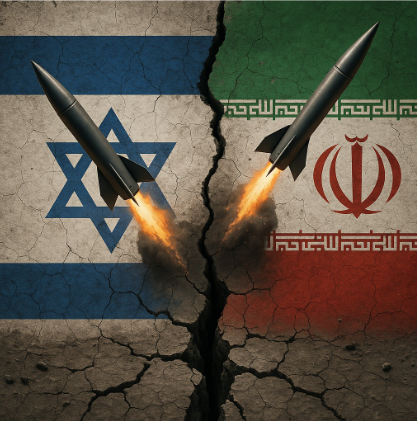World watches as Israel hits Iran

[Flags of Iran and Israel with missiles. AI-generated illustration created using DeepAI]
On June 13, just after 3 a.m., over 200 Israeli jets launched a sudden and massive airstrike on Iran, targeting Tehran, Natanz’s nuclear facility, and top military officials.
The scale and precision of the attack stunned the world and raised concerns about the future of stability in the Middle East.
As of June 14, the Iranian Health Ministry reported that 224 civilians had been killed in the attacks.
Many experts say this was meticulously planned for a long time.
Immediately following the attack, the president of Iran declared that they would counterattack against Israel.
This military strike came just days before a key diplomatic meeting to discuss Iran’s nuclear development.
The United States had planned to hold a meeting in Oman on June 15 to address Iran’s nuclear weapon development.
Iran had previously denied developing nuclear weapons before that.
According to Israeli officials, Iran was storing uranium, which is a resource used for nuclear weapons, in amounts beyond necessity.
This discovery made Israel feel increasingly threatened, and some believe it was a key factor behind their decision to launch the attack.
While nuclear concerns played a key role, the reasons behind the attack go beyond national security –including growing international pressure and internal political struggles.
Recently, Saudi Arabia and France discussed how to resolve Israel's occupation issue in Gaza at the UN General Assembly.
Since this could create unfavorable international sentiment against Israel, analysts believe Israel felt increasingly isolated internationally.
At the same time, Prime Minister Netanyahu has been facing serious challenges at home that may have influenced the timing of the strike.
Not only has there been a trial related to corruption, but recently there has also been a scandal involving allegedly receiving funds from the Qatar royal family, which has made his position as Prime Minister increasingly uncertain.
There was a vote on whether to dissolve the Knesset, the Israeli parliament, and although the result was not to dissolve it, this only secured a six-month extension, leaving Netanyahu with lingering uncertainties.
Critics suggest that these internal struggles may have pushed Netanyahu to act aggressively toward Iran as a way to strengthen his political position.
The United States stated that they will not support or engage in this conflict between Iran and Israel.
Regarding the possibility of World War III, experts say it is highly unlikely because Iran and Israel are geographically distant and ground warfare would be impossible, which makes large-scale conflict difficult to sustain.
Iran’s Foreign Minister has stated they will stop counter- attacking if Israel stops, indicating that Iran does not want to escalate this situation further.
In the end, while the scale and intensity of Israel’s attack on Iran shocked the world, the chances of it turning into a full-scale world war remain low for now.
Iran’s response has been strong but measured, showing signs that it wants to avoid further escalation.
However, tensions in the Middle East are clearly rising, and the situation remains fragile.
As global powers watch closely, the coming weeks will be critical in determining whether this becomes a turning point in regional stability or the beginning of long-term instability in the Middle East.

- Danny Jung / Grade 11 Session 2
- Belmont Secondary School

![THE HERALD STUDENT REPORTERS [US]](/assets/images/logo_student_us.png)
![THE HERALD STUDENT REPORTERS [Canada]](/assets/images/logo_student_ca.png)
